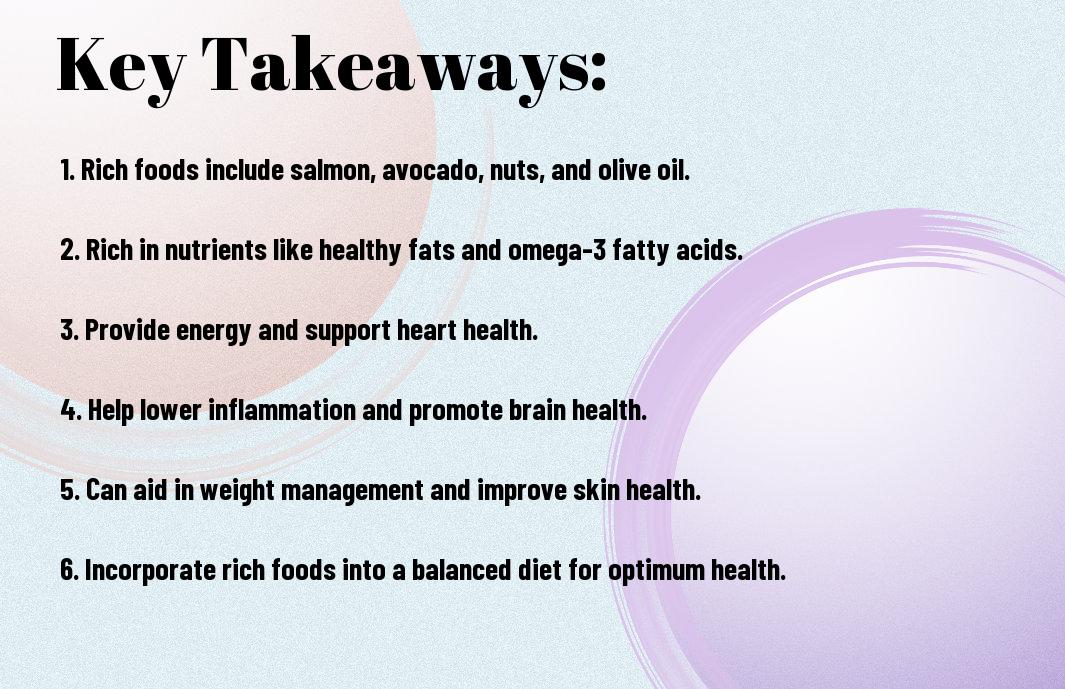Just imagine feeling energized and nourished by incorporating these 5 rich foods into your daily diet. These nutrient-dense powerhouses not only provide important vitamins and minerals but also offer a delicious way to support your overall health. Let’s explore the top 5 rich foods that can elevate your meals and boost your well-being effortlessly.
Key Takeaways:
- Salmon: A rich source of omega-3 fatty acids that can help reduce inflammation and improve heart health.
- Avocado: Packed with healthy fats, fiber, and various vitamins and minerals, making it a nutritious addition to any diet.
- Walnuts: High in antioxidants and omega-3 fatty acids, which are beneficial for brain health and reducing the risk of heart disease.
Rich Food #1: Fatty Fish
The Omega-3 Powerhouse
The first rich food on our list is fatty fish. These fish are packed with vital nutrients that can greatly benefit your health.
Health Benefits of Fatty Fish
Fatty fish, such as salmon, mackerel, and sardines, are rich in omega-3 fatty acids. These healthy fats are known for their numerous health benefits, including reducing inflammation, improving heart health, and supporting brain function.
It’s recommended to include fatty fish in your diet at least twice a week to reap the full benefits of these omega-3 powerhouses. Incorporating them into your meals can be as simple as grilling a salmon fillet, adding sardines to a salad, or enjoying a tuna sandwich.


Rich Food #2: Egg Yolks
You might think that eggs are off-limits when it comes to eating healthy, but think again! Egg yolks are a rich source of vital nutrients that can benefit your body in various ways. According to Nutrient Rich Foods – Vitamins and Minerals, egg yolks are considered a superfood due to their high content of vitamins, particularly vitamins A, D, E, and K, as well as minerals like calcium and iron.
The Golden Ticket to Vitamins
Food for thought: The golden hue of egg yolks comes from the presence of carotenoids, which are powerful antioxidants. These antioxidants can help protect your cells from damage, reducing the risk of chronic diseases and promoting overall health and well-being.
Debunking the Cholesterol Myth
Tickets to the truth: Contrary to popular belief, the cholesterol found in egg yolks may not have as big of an impact on your blood cholesterol levels as once thought. Studies have shown that eating whole eggs, yolk included, does not necessarily lead to an increase in cholesterol for most people. In fact, the cholesterol in egg yolks is vital for hormone production and brain function.
Cholesterol: It’s important to note that dietary cholesterol, like that found in egg yolks, does not have the same effect on blood cholesterol levels as saturated and trans fats do. So, don’t be afraid to enjoy the richness of egg yolks in moderation as part of a balanced diet.
Rich Food #3: Grass-Fed Beef
After exploring the benefits of wild-caught salmon and organic eggs, let’s explore another rich food that packs a nutritional punch – grass-fed beef. This nutrient-dense red meat is a powerhouse of crucial nutrients that can benefit your health in various ways.
The Nutrient-Dense Red Meat
Nutrient-dense grass-fed beef is an excellent source of high-quality protein, crucial amino acids, and important vitamins and minerals like iron, zinc, and B vitamins. These nutrients are vital for optimal energy levels, muscle growth, immune function, and overall well-being. By including grass-fed beef in your diet, you can ensure that you are getting a wholesome source of nutrients that your body needs to thrive.
Why Grass-Fed Trumps Grain-Fed
NutrientDenseIn the matter of choosing between grass-fed and grain-fed beef, opt for grass-fed whenever possible. Grass-fed beef is not only richer in beneficial nutrients like omega-3 fatty acids and conjugated linoleic acid (CLA) but also lower in unhealthy fats like saturated fat. Additionally, grass-fed beef is raised in a more natural and humane way, without the use of antibiotics or hormones.
GrainFedGrain-fed beef, on the other hand, is typically raised in feedlots and fed a diet that consists of genetically modified corn and soy. This can lead to higher levels of inflammatory omega-6 fatty acids and lower levels of beneficial nutrients in the meat. By choosing grass-fed beef, you are not only supporting your health but also sustainable and ethical farming practices.
Rich Food #4: Dark Leafy Greens
Not sure where to start when it comes to incorporating dark leafy greens into your diet? Start by exploring The five food groups recommended by health experts. Dark leafy greens fall under the vegetable category and are rich in imperative nutrients that your body needs to thrive.
The Mineral-Rich Superfood
For a mineral-rich superfood that can boost your overall health, look no further than dark leafy greens. These greens are packed with imperative minerals like iron, calcium, and magnesium, which are vital for proper functioning of your body. Incorporating a variety of dark leafy greens such as spinach, kale, and Swiss chard into your diet can help you meet your daily mineral requirements.
Cooking Methods to Maximize Nutrition
Superfood dark leafy greens retain the most nutrients when cooked lightly. Quick cooking methods like steaming or sautéing can help preserve the vitamins and minerals in these greens. Overcooking can lead to nutrient loss, so aim to cook your dark leafy greens until they are just tender but still vibrant in color.
Greens are a versatile ingredient that can be added to salads, soups, stir-fries, and smoothies. Experiment with different cooking methods to find the ones that suit your taste preferences while maximizing the nutritional benefits of these nutrient-dense greens.

Rich Food #5: Full-Fat Dairy
The Calcium-Rich Delight
Your journey to discovering rich foods leads you to full-fat dairy, a calcium-rich delight that can offer numerous health benefits. Whether you’re indulging in creamy Greek yogurt, savoring a slice of cheese, or enjoying a cold glass of whole milk, full-fat dairy is a decadent option that can enhance your overall well-being.
The Benefits of Full-Fat Over Low-Fat
For those seeking the best nutritional value from their dairy choices, opting for full-fat versions over low-fat varieties can be advantageous. Full-fat dairy products not only provide a richer and more satisfying taste experience, but they also offer benefits that low-fat versions may not match.
For example, full-fat dairy can contribute to increased satiety, helping you feel fuller for longer periods. This can aid in weight management by potentially reducing overall calorie intake throughout the day. Additionally, full-fat dairy products often contain fat-soluble vitamins like vitamin D, which are important for various bodily functions, including bone health and immune system support.
Incorporating Rich Foods into Your Diet
Unlike processed foods, incorporating rich foods into your diet can provide vital nutrients and health benefits. By swapping out empty-calorie snacks for nutrient-dense options, you can enhance your overall well-being and energy levels.
Tips for Meal Planning and Prep
- Start by creating a weekly meal plan that includes a variety of rich foods such as nuts, seeds, avocados, and oily fish.
- Batch cooking rich ingredients like quinoa, lentils, and lean proteins can save time during busy weekdays.
Any leftovers can be repurposed into delicious lunches or dinners, ensuring that you stay on track with your rich food consumption goals.
Rich Food Combinations for Maximum Nutrition
Diet plays a crucial role in your overall health, and combining rich foods strategically can maximize the nutritional benefits you receive. By pairing vitamin C-rich fruits with iron-rich foods like spinach or lentils, you can enhance iron absorption and boost your immune system.
The key is to focus on creating balanced meals that incorporate a variety of rich foods to ensure you’re getting a wide range of nutrients to support your well-being.
Final Words
Hence, incorporating these 5 rich foods into your diet can have significant health benefits. By including foods like salmon, blueberries, almonds, spinach, and sweet potatoes in your meals, you can boost your overall well-being and nutrition. Note, a balanced diet rich in nutrients is key to maintaining a healthy lifestyle. So next time you’re planning your meals, be sure to include these nutritious options for a delicious and healthful eating experience!
FAQ
Q: What are some examples of rich foods?
A: Rich foods typically refer to foods that are high in nutrients, calories, or flavor. Some examples of rich foods include avocados, nuts, salmon, dark chocolate, and olive oil.
Q: How can rich foods benefit my diet?
A: Rich foods can provide crucial nutrients such as healthy fats, vitamins, minerals, and antioxidants, which are important for overall health and wellbeing. Incorporating rich foods into your diet in moderation can help support a balanced and nutritious eating plan.
Q: Are rich foods suitable for everyone?
A: While rich foods can offer numerous health benefits, it’s important to consume them in moderation, especially if you have dietary restrictions or specific health conditions. Consult with a healthcare provider or nutritionist to determine the best approach for incorporating rich foods into your diet based on your individual needs and preferences.
